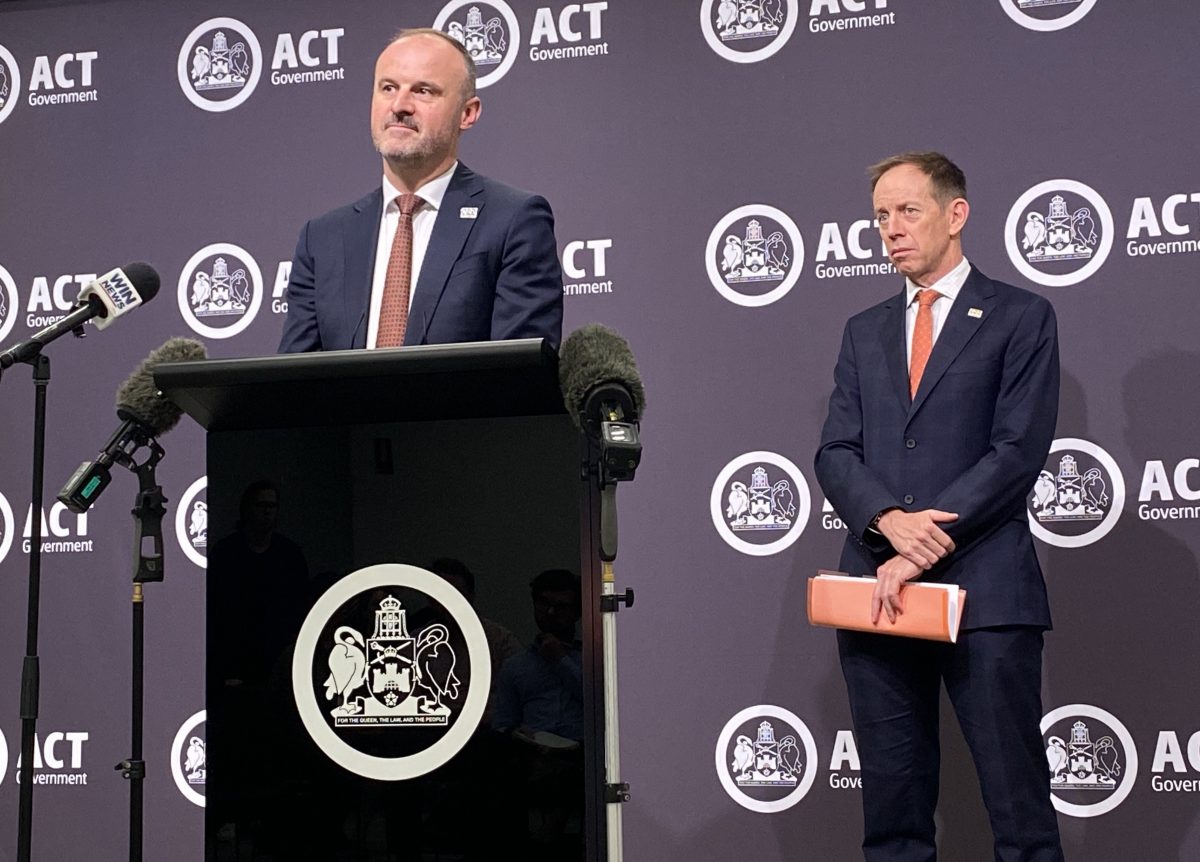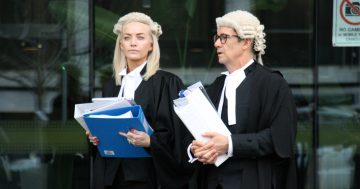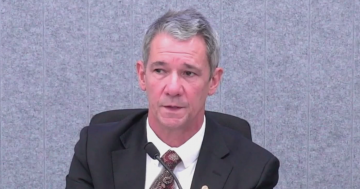
Chief Minister Andrew Barr and Attorney-General Shane Rattenbury outlining the Board of Inquiry into the conduct of criminal justice agencies before, during and after the R v Lehrmann trial. Photo: Claire Fenwicke.
The conduct of ACT Policing officers, the Director of Public Prosecutions (DPP) and the Victims of Crime Commissioner will all be examined by a Board of Inquiry into the handling of the case against Bruce Lehrmann.
However, questions have been raised about why these organisations and people are singled out to be examined, but potential influence or interference by the ACT Government has been excluded.
Former Queensland Solicitor-General Walter Sofronoff KC has been appointed the Chair and assisted the government in finalising the terms of reference for this Board of Inquiry, which was originally announced at the end of last year.
Attorney-General Shane Rattenbury said the terms would give Mr Sofronoff “significant latitude” to ask broad questions, particularly of the criminal justice agencies involved.
“We have not sought to define the questions [Mr Sofronoff] should ask,” Mr Rattenbury said.
“[It’s] simply, did they fulfil their duties? And if he considers they did not, the reasons and motives for their actions.
“We have not sought to define the possible reasons or motives, simply left it to answer those questions.”
No firm date has been set for the inquiry to begin, although it’s expected to start “almost immediately” once Mr Sofronoff arrives in Canberra.
Public hearings have not been guaranteed. While the legislation allows for them, and the ACT Government has expressed its wish to be “very transparent”, the decision is up to Mr Sofronoff.
“[We’ve] underlined our view that this is really important, that we answer the questions that have been posed, and that there is a clear understanding of the circumstances and concerns that have been raised,” Mr Rattenbury said.
“We have not sought to dictate to him how he conducts this inquiry; we’ve certainly indicated our expectation that he do it in a way that does provide public confidence.”
The Board of Inquiry will also examine whether any police officers failed to act in accordance with their duties or breached their duties when investigating Brittany Higgins’ allegations against Mr Lehrmann, when dealing with the DPP and when dealing with Mr Lehrmann’s legal representatives before, during or after the trial.
These were all concerns raised in a letter from the DPP to ACT Policing Chief Police Officer Neil Gaughan before a retrial of the case was abandoned.
Police conduct in the case was also referred to the Australian Commission of Law Enforcement Integrity last November.
One issue that’s been removed from the Board of Inquiry is that of juror misconduct which caused the mistrial of the R v Lehrmann case.
Mr Rattenbury said this was because Mr Sofronoff felt this was a policy matter for the government.
“We do need to examine those matters in light of the comments of the Chief Justice during that particular trial … but Mr Sofronoff does not intend to go into matters of policy for government,” he said.
When questioned by Region why the ACT Government or Attorney-General’s potential actions or motives during the trial weren’t specifically included in the terms of reference, Mr Rattenbury said it was still broad enough for the allegations to be considered.
“It talks about if somebody operated outside how they should have, what were the reasons and motive for that, so that could include political interference,” he said.
“It could include a range of other things. There is no limit on [Mr Sofronoff’s] ability to look at those matters as to why people conducted themselves in the way they did.”
Canberra Liberals leader Elizabeth Lee said potential political influence should be specifically mentioned to ensure the allegations were properly considered and examined.
“What is starkly missing is the addressing of the very serious allegation of political interference,” she said.
“Despite the fact the word ‘motivations’ has been used, why leave it to the doubts and the uncertainty of ‘ifs’ or ‘what if this happens?'”
Ms Lee also stressed the hearings must be held publicly in the interest of community confidence.
“Obviously, this whole case and its conduct has garnered extreme attention from the public … there is no doubt a lot of people have an interest in seeing how the investigation is undertaken and what the various players will have to say,” she said.
“I’m sure [Mr Sofronoff] will make the call in terms of whether public hearings will be beneficial in bringing back public confidence because it has absolutely taken a battering.”
Ms Lee also questioned why the Victims of Crime Commissioner was recently reappointed for another five years – rather than have her position on hold – given the inquiry will examine her conduct.
“You can’t have on one hand a government saying ‘we’re going to looking seriously at the conduct of this Commissioner’ and on the other hand saying ‘but we have full confidence, so we’re actually going to reappoint [her]’,” she said.
“This is the question that the Attorney-General must answer, along with the fact that his conduct is not being looked at.”
Ms Yates’ presence at the Lehrmann trial was questioned during the annual reports hearings last year.
The Board of Inquiry will report to Chief Minister Andrew Barr by 30 June but it will not be released on that date.
Once received, Mr Barr is required to report to the Legislative Assembly within a certain timeframe, and Cabinet will consider whether the government releases a full or interim response.
“Its timing for public release will be, at the earliest late July, but more than likely in the month of August,” Mr Barr said.
“I’m not in a position to comment on whether I will release [the report] fully or partially, other than to say, unless there is a good reason to redact any element, my intent would be that it would be released in full.”

















